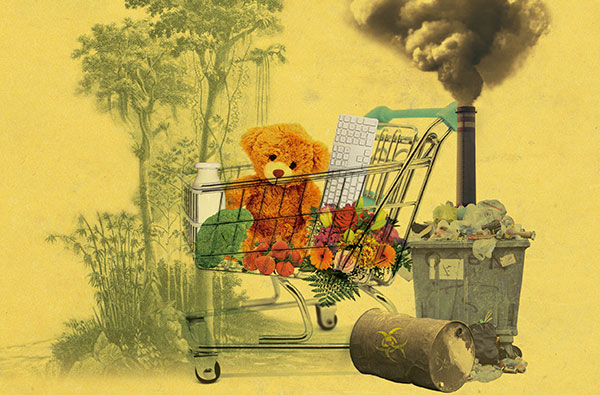[Retratos] SDG 12: Responsible consumption and production
January 03, 2018 09h00 AM | Last Updated: January 04, 2018 09h48 AM
Efficient management and use of natural resources, reduction of food waste, responsible management and reduced generation of chemical and solid waste, reduced emission of pollutants, guidance on sustainable consumption, promotion of sustainable practices in companies and of a sustainable agenda in public companies. Those are some of the targets to reduce our ecological footprint and achieve sustainable economic growth and social development. Read below an interview with José Sena, researcher from the IBGE, about that broad goal which encompasses the production sector, citizens and the government.

Retratos Magazine: How does SDG 12 evaluates sustainability in the production chain?
José Sena: SDG 12 evaluates the movement of society towards sustainability in production and consumption patterns, in terms of economic activities. That is a very broad goal, and it encompasses several areas: international treaties, sustainable bidding processes, food waste, harvesting losses, management of solid waste...
Retratos: What role does the IBGE play in that SDG?
José: The role of the IBGE, as Brazil's official statistical bureau, is to provide statistics on the fulfillment of that goal and also on our position in relation to other parts of the world.
Retratos: What has the IBGE done so far?
José: Most of the indicators proposed are classified as “Tier 3” (indicators which do not yet have a fixed methodology and that need a database). It is our role, together with other international statistical bodies, to see what is new and bring to Brazil. We need to know what institutions produce those data and how we can use them with our statistics.
Retratos Magazine: What about the support from other institutions?
José: That support is fundamental. In the case of production and consumption patterns, some economic surveys of the IBGE can help, but there is a lot of the information comes from other institutions. The IBGE has to harmonize that, measure information statistically, and find out about the statistical pattern and the international norms adopted, and then implement all those in other institutions.
Retratos Magazine: What indicators are currently being discussed with other institutions, for example?
José: Food waste is a topic we have discussed very often. That is still part of “Tier 3”, but already being developed. We have had meetings with Brazilian institutions that produce food, such as Embrapa, the Ministry of Development and also FAO (Food and Agriculture Organization of the United Nations) and are now considering the organization of that vast source of information in order to organize the statistics of it.
Retratos Magazine: Are the green GDP and environmental accounts also related to SDG 12?
José: They are. In target 12.2, where it reads “achieve the sustainable management of natural resources”, some indicators refer to the material footprint; many are still under construction. The economic accounts will provide significant contributions to the proposed material consumption indicators. How much of our natural resources is employed in the production? That surely depends on what pattern Brazil has chosen to follow.
Retratos Magazine: Among the priorities set by SDG 12 are the implementation of an environmental agenda in public administration and sustainable purchases by the government. What does that mean?
José: The government sector, in all the countries in the world is a very important stimulator of the economy. Once the government adopts sustainable consumption patterns, with sustainable bidding processes or the purchase of environmentally responsible products, it gives the society and other economic segments a very good example. That will be an incentive to sustainable production in general.
Retratos Magazine: What are the main challenges of SDG 12?
José: Having the information organized. There is a very broad basis, but the information is scattered and it is not always produced in due time.
Retratos Magazine: Is that challenge observed only in Brazil of do other countries have that same difficulty?
José: The challenge of standardizing scattered data is faced at global scale, by all the countries engaged in this mission.
Text (in Portuguese): Irene Gomes
Illustration: Licia Rubinstein




















